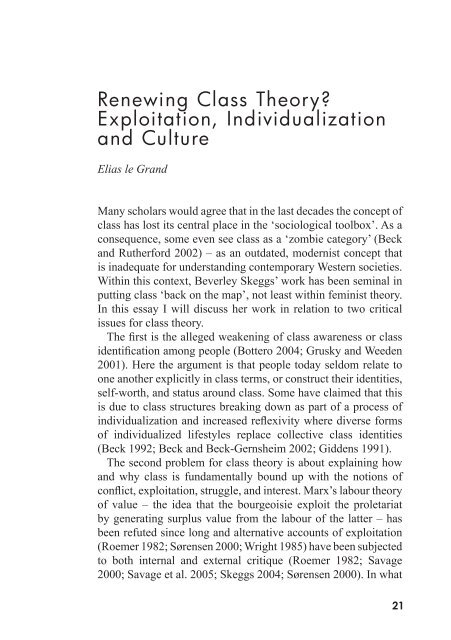Thinking with Bevereley Skeggs - Stockholms universitet
Thinking with Bevereley Skeggs - Stockholms universitet
Thinking with Bevereley Skeggs - Stockholms universitet
- No tags were found...
You also want an ePaper? Increase the reach of your titles
YUMPU automatically turns print PDFs into web optimized ePapers that Google loves.
Renewing Class Theory?Exploitation, Individualizationand CultureElias le GrandMany scholars would agree that in the last decades the concept ofclass has lost its central place in the ‘sociological toolbox’. As aconsequence, some even see class as a ‘zombie category’ (Beckand Rutherford 2002) – as an outdated, modernist concept thatis inadequate for understanding contemporary Western societies.Within this context, Beverley <strong>Skeggs</strong>’ work has been seminal inputting class ‘back on the map’, not least <strong>with</strong>in feminist theory.In this essay I will discuss her work in relation to two criticalissues for class theory.The first is the alleged weakening of class awareness or classidentification among people (Bottero 2004; Grusky and Weeden2001). Here the argument is that people today seldom relate toone another explicitly in class terms, or construct their identities,self-worth, and status around class. Some have claimed that thisis due to class structures breaking down as part of a process ofindividualization and increased reflexivity where diverse formsof individualized lifestyles replace collective class identities(Beck 1992; Beck and Beck-Gernsheim 2002; Giddens 1991).The second problem for class theory is about explaining howand why class is fundamentally bound up <strong>with</strong> the notions ofconflict, exploitation, struggle, and interest. Marx’s labour theoryof value – the idea that the bourgeoisie exploit the proletariatby generating surplus value from the labour of the latter – hasbeen refuted since long and alternative accounts of exploitation(Roemer 1982; Sørensen 2000; Wright 1985) have been subjectedto both internal and external critique (Roemer 1982; Savage2000; Savage et al. 2005; <strong>Skeggs</strong> 2004; Sørensen 2000). In what21
















